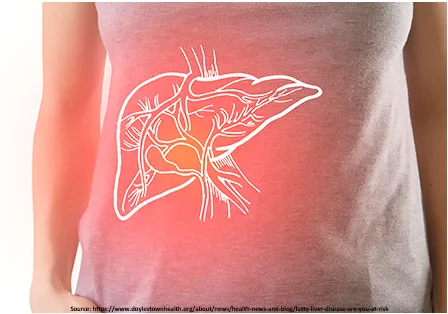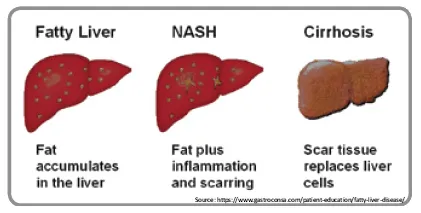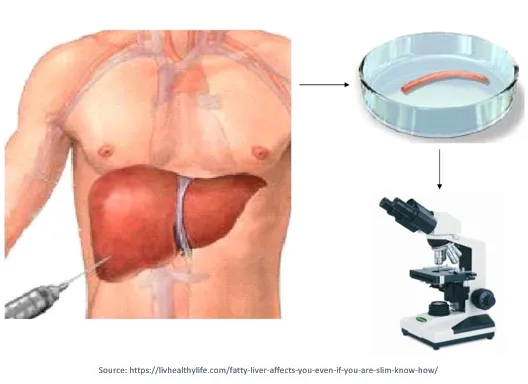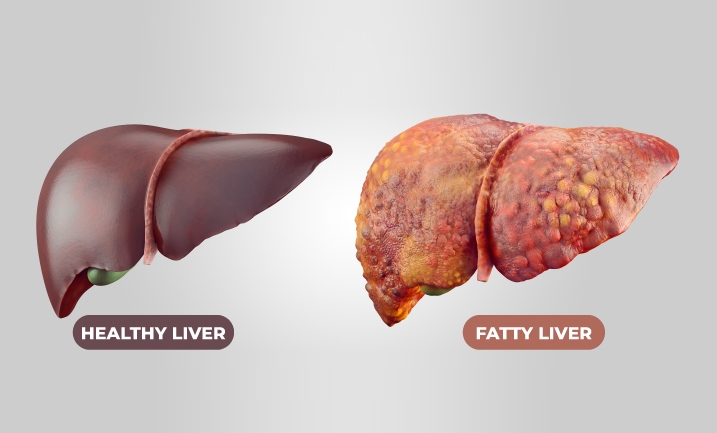Do you know that a person can get a liver disease even if he or she doesn’t drink alcohol?
Non-alcoholic fatty liver disease-NAFLD is a condition in which fat builds up in the liver. Non-alcoholic steatohepatitis (NASH) is a type of NAFLD that can impair the liver.

NASH occurs when the fat build-up in the liver leads to inflammation (hepatitis) and scarring. In a study, liver experts estimated that 3% to 5% of the global population is affected by NASH, though it is considered underdiagnosed.
This blog gives an overview of Non-alcoholic steatohepatitis, its symptoms, causes, diagnosis, and treatment.
What is Nonalcoholic Steatohepatitis (NASH), and how does it affect an individual?
The inflammation and destruction caused by fat accumulation in the liver are known as nonalcoholic steatohepatitis (NASH). It is a type of nonalcoholic fatty liver disease.
An excess of fat in the liver affects many individuals, but it usually causes no signs of complications. Fat, on the other hand, can cause inflammation and damage to liver cells in certain people. The liver does not function as well as it does as a result of the damage.

NASH can worsen and lead to liver scarring, which can lead to cirrhosis. However, the condition does not necessarily deteriorate.
NASH affects the liver similarly as in liver conditions caused due to excessive alcohol consumption. But NASH develops in individuals who don’t drink alcohol.
What are the signs and symptoms of nonalcoholic steatohepatitis (NASH)?
In the initial stages of NASH, the patient will have no symptoms. The majority of people with NASH are entirely unaware that they have it.
If NASH progresses, the liver damage worsens so that the patient can experience symptoms such as:
- Fatigue
- Sudden weight loss
- Weakness
- Pain in the upper right part of the abdomen
NASH will take several years to progress to the point that it causes symptoms.
What causes Nonalcoholic Steatohepatitis (NASH)?
Experts are unsure why some patients accumulating fat in the liver develop NASH, and others do not. Some environmental factors may be causing inflammation in specific individuals. Or maybe it is something that runs through their family.
A variety of factors can cause NASH and liver damage, including:
- Obesity
- Insulin resistance and type 2 diabetes
- Elevated cholesterol and triglycerides levels
- Metabolic syndrome
- Hypertension
The majority of NASH patients are between the ages of 40 and 50 and have one or more of the mentioned conditions. However, NASH can also develop in individuals who do not have any of these risk factors.
How is Nonalcoholic Steatohepatitis (NASH) diagnosed?
A single examination cannot diagnose NASH. A liver specialist can inquire about the patient’s medical history.
To see whether fat is accumulating in the liver and to rule out other diseases, the liver specialist can order specific tests such as:

- Blood tests
- Ultrasound
- CT scan
- MRI scan
The liver specialist may perform a liver biopsy to diagnose NASH. In a liver biopsy, the specialist takes a sample of tissue from the liver and observes it for signs of NASH.
How is Nonalcoholic Steatohepatitis (NASH) treated?
Managing symptoms that raise the chance of NASH or make it worse is part of NASH treatment.
The liver specialist instructs and guides the patient for:
- Regulating the total cholesterol level.
- Maintaining a healthy weight. It can make a difference if the patient can correct his/her BMI to bring it down to less than 25
- Controlling diabetes.
- Quitting or reducing alcohol consumption.
- Exercising daily
In some cases, the liver specialist may prescribe medicines to control or reverse liver damage caused by NASH.
In some NASH patients, severe liver damage may cause its failure. For such patients, a liver transplant is the only option for survival. The patients can lead a healthy life after transplant if they eat a balanced diet and take prescribed medications.
Make an appointment with an experienced liver specialist to receive the most effective treatment for liver-related conditions.

